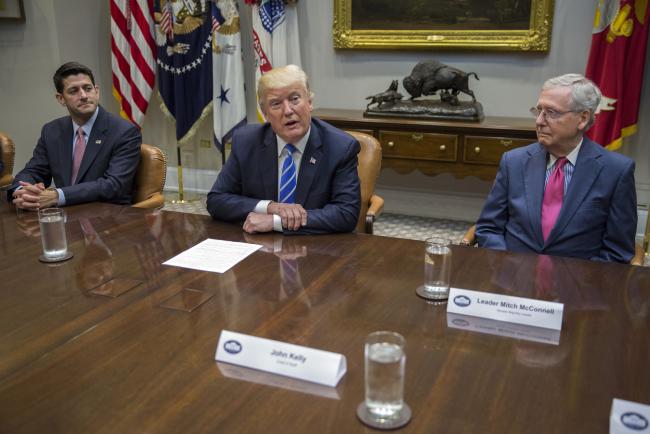Street Calls of the Week
(Bloomberg) -- Cutting the corporate tax rate to 20 percent would speed up economic growth enough to eventually make the U.S. economy 3 to 5 percent larger than it otherwise would be, according to an analysis produced by President Donald Trump’s White House.
The analysis, released Friday by Trump’s Council of Economic Advisers, also repeats the panel’s finding that the corporate tax cut would increase average household income by at least $4,000. Other economists have questioned that claim.
Kevin Hassett, the chairman of the CEA, said Friday that some models show that it would take three to five years for the increase in gross domestic product to take place. Other models show it could take twice that long, he said.
The paper combines the effects of cutting the corporate rate, which is now 35 percent, with another proposal to allow companies to immediately write off the cost of certain capital investments. Under current law, such investments are written off over years through depreciation.
In combination, the corporate rate cut and the move toward so-called “full, immediate” expensing of equipment purchases would lower the cost of capital and “generate an expected additional long-run increase in GDP of 4.2 percent” over the current forecast by the Congressional Budget Office, according to the analysis.
Factories Overseas
“Firms are locating their new factories and their machines over there in Ireland and in other countries rather than creating jobs here,” Hassett said during a Bloomberg TV interview. “If we want to keep this recovery going then what we need to do is just get capital deepening to increase productivity, increase wages, and give us the economic growth that we need.”
The tax framework that the White House and congressional leaders released last month calls for allowing businesses to engage in full expensing “for at least five years.” Limiting the provision to that amount of time “would reduce the long-run steady state growth effect to 3.1 percent,” according to the analysis.
While the report twice describes the wage growth projections as “back-of-the-envelope” estimates, Hassett said a $4,000 boost to average income was a conservative prediction backed up by economic literature.
House Ways and Means Chairman Kevin Brady plans to introduce a tax bill on Wednesday. Hassett said he expects the bill may include details that could change the CEA’s analysis.
“I expect that as the complete plan is available, there will be changes to our analysis,” he said.
The GOP framework calls for cutting tax rates on corporations, partnerships and limited liability companies. It would also consolidate the existing seven individual tax rates to three or four -- with a decision on the highest tax bracket left up to congressional tax writers.
(Updates with additional comment from CEA Chairman Kevin Hassett in sixth paragraph.)
